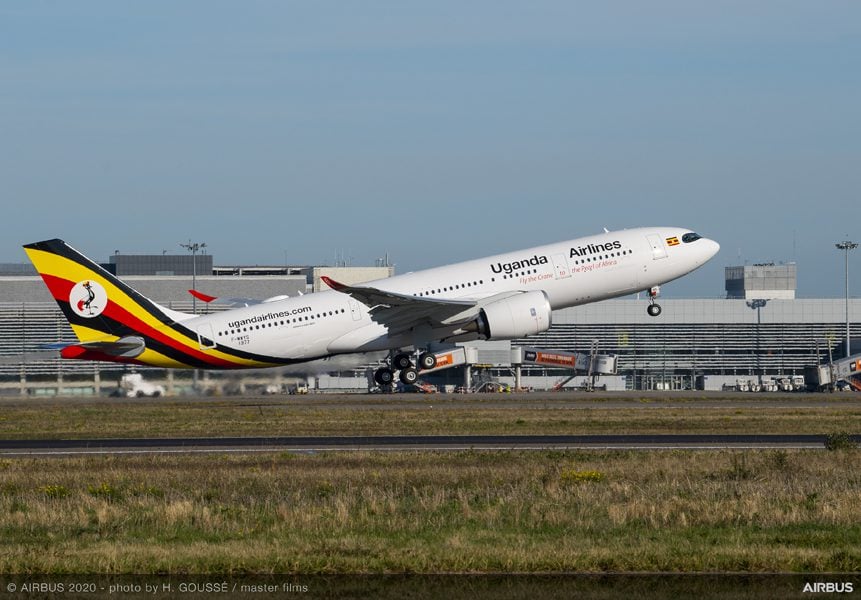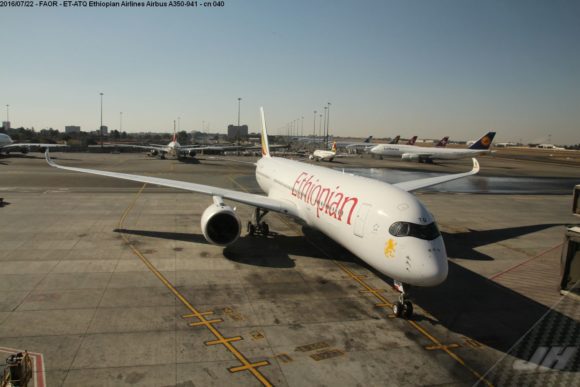
A330neo Uganda Airlines MSN1977 first flight 007
The frequent changes in airlines management have called to question the focus of Uganda Airlines to provide seamless air transport services. The carrier three days ago unveiled a new board of directors, three months after the old board and the Chief Executive Officers were sacked. The airline’s new board chaired by Priscilla Mirembe Serukka was unveiled on April 1.
The old board was chaired by Ahabwe Perez and was first suspended in April last year with the airline’s Chief Executive Officer, Director of Finance, Human Resource, Director, Safety, and others to pave way for investigations. Three months ago they were fired after being accused of mismanaging the airline’s finances. The process of searching for a new team started then.
Uganda Airlines is the flag carrier of Uganda. The company is a revival of the older Uganda Airlines, which operated from 1977 until 2001. The company launched commercial flights in August 2019. The airline said in January that it planned to launch long-haul services to Europe, the Middle East, and the Far East as early as this year after the pandemic derailed earlier plans to go there.
In its latest auditor’s report to Parliament, Auditor General, John Muwanga named the company as the worst performing state enterprise whose performance was reduced from the previous years due to the devastating impact of the COVID-19 pandemic.

Photo by Eddie Ssejjoba
Huge losses
According to Muwanga, the company earned $113 million but spent $165 million. He further stated that during the year under review, the company was unable to realize its planned revenue, yet the expenditure on operations was way above projected costs. “The company only realized $9.9 million (10.8 percent) of the projected revenue of $92.8 million. On the other hand, the company incurred expenses that were beyond the planned costs of and its actual revenue”.
“For example, the company spent $29.2 million on direct costs and $3.6 million on indirect costs. As a consequence, the company incurred a net loss of $27.4 million in the year”, said Muwanga. The audit report further indicated that whereas the government had invested a total of Sh934 billion, and reflected it as an investment in the treasury records at the Ministry of Finance, only Sh200 million was shown as share capital in the company statement, the rest of the amount was shown as share capital funds.
Return to the skies
Less than three years ago, Uganda celebrated the return to the skies of the reincarnation of its national airline. The airline could not have had a better start, announcing route after route in an ambitious network expansion campaign and with an eye on regional dominance. With four new CRJ 900s, Uganda Airlines had the perfect tool for regional operations. A regional jet with the right size and flexibility to balance capacity and demand across the market.
After all, no airline ever went out of business for having an aircraft too small. Large wide-body aircraft along with blue ribbon intercontinental routes have very often been the poisoned chalice that has eaten away at the business sense in African aviation. The impact of Covid-19 on global aviation has been well documented, however.
African carriers’ abysmal record
African airlines already have a less than desirable financial record that has not been spared. Air Namibia collapsed after 75 years, Malawi Airlines was facing liquidation in the early part of 2021, and Air Mauritius had to enter administration and subsequently faced a restructuring. Air Tanzania, Air Zimbabwe, and Kenya Airways had to receive substantial bailouts from their respective governments in order to stay afloat. The crisis and consequent need for financial aid seemed to be the perfect opportunity to paper over the cracks of poorly run entities.
With about half of the year spent kick-starting operations and establishing itself in the regional market, and the other half consumed by an unprecedented air transport crisis as a result of the coronavirus, the airline could be forgiven for realizing only about 10% of projected revenue.
Ethiopian Airlines, an exception
But one state-owned airline did buck this trend: Ethiopian Airlines. It did not just do weather the storm, it managed to turn a profit and cemented its position as a shining example and benchmark for success in Africa. How did they do it and what lessons can we learn? Ethiopian displayed remarkable resilience and agility throughout the crisis, converting a large number of its passenger aircraft to enable the transport of cargo.
Airbus presented the airline with an award for its unique response to the crisis. Hadi Akoum, Airbus Vice President, Sales for Africa said during an award presentation: “This is to express the admiration of Airbus executive management and Airbus employees for the unbelievable achievement of Ethiopian Airlines in this unprecedented epidemic. While other airlines were just trying to figure out what to do, Ethiopia Airlines was aggressively pressing ahead finding solutions, creating solutions, converting their passenger aircraft to freighters.”
He added that “Ethiopian Airlines is the first one to do it on Airbus A350 and continues to fly and create even new business. This is something unique all over the world. Today, Ethiopian Airlines is able to maintain the operation of all fleet where others are at ten percent of their capability, and many airlines have just simply gone bankrupt and people have lost their jobs. This has been done because of the visionary leadership of Mr. Tewolde GebreMariam. Ethiopian Airlines today is showing an example to the whole world in resilience and visionary thinking of leadership.”
Corporate governance
Corporate governance is essential to the separation of management and ownership in the modern corporation. Accountability in the use of power, authority, and ownership and aligning the interests of individuals, corporations, and society is critical to the success of a state-owned entity such as a national airline. Lack of leadership stability is a challenge facing African aviation with the direct consequence being that long-term thinking and strategy are severely hampered. Embattled flag carrier, South African Airways is currently being led by its 13th CEO in 12 years and emerging from 18 months of business rescue, a form of bankruptcy protection.
Uganda Airlines is currently starting a third CEO tenure in under two years and is in the midst of a leadership crisis. While corporate governance failures are an all too familiar story in Africa, a culture of successive appointments at the top including acting and interim executives can only damage stakeholder confidence and the image of the Airline as it points to a high degree of instability and political interference.
Political interference rears its ugly head
The national airline is a strategic asset that’s woven into the fabric of the economy with long-term thinking and broader economic benefits in mind. However, interventions such as the one currently happening at the airline only serve to diminish the legitimacy of government ownership knowing that corruption is a culture in the public sector and corporate governance a big challenge for state-owned entities.
There is no CEO in the world who will steer the airline to success as long as a high degree of political interference drives key appointments and higher authorities cannot keep their hands off of day-to-day operations and let professionals do their work. Good governance principles can only be successful when those placed in positions of authority are left to manage and the same CEOs lead with principles and strict values because their careers and reputations are equally at stake
While stamping down on corruption is commendable, Uganda airlines will need to completely overhaul itself and enhance the accountability and performance of those entrusted to manage it.
Views: 6




